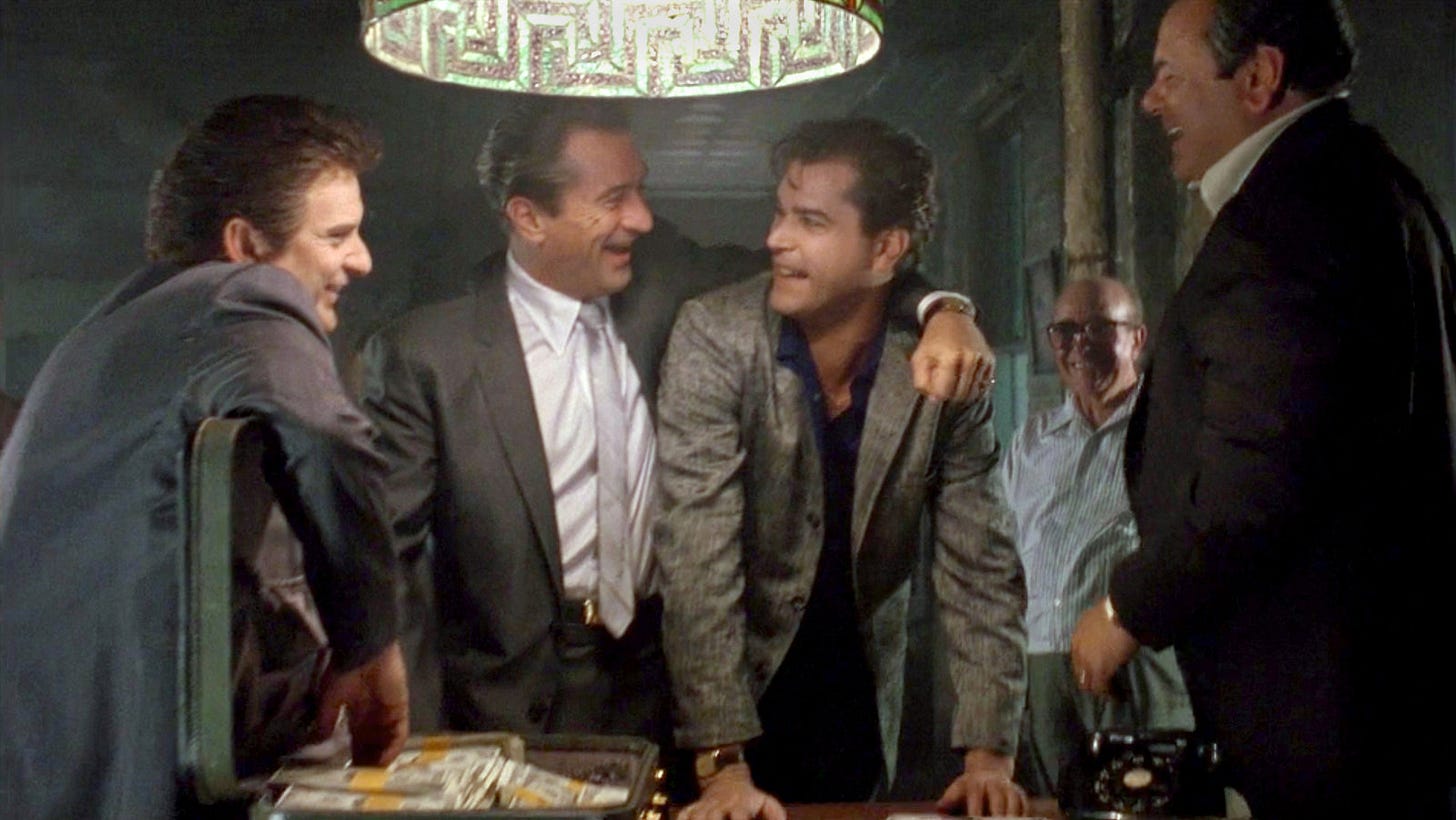Goodfellas: Masterful Filmmaking with an Ear for the Music
Scorsese is a visual stylist, but it’s his song use that makes this 1991 Oscar nominee stand out
I know that a lot of our 1991 Oscars podcast is about my love for Goodfellas. But as usual, I have a few more things to say about what makes the movie great and why it’s one of my favorites of all time.
Getting snubbed for Best Picture and Best Director is one thing, but Goodfellas not getting the Oscar for Best Screenplay? That really annoys me and shows how the Academy just gets lazy about voting. Dances with Wolves was their pick and they gave it awards it didn’t even deserve like Best Editing and Best Screenplay.
Think about having to condense a story that covers 30 years into less than two and a half hours, establishing the characters enough that you feel the weight of the climax on all of them at the end. You actually feel bad for Paulie getting screwed by his guys after telling them to stay away from drugs. You need to have scenes that carry a lot of the story so the payoff has weight.
I believe Goodfellas would not be a movie today and it would be made into a prestige television series of six or eight episodes. Being able to tell a sprawling story in movie form seems to be a dying art, and since streaming services always need content anything that can be formatted into a TV show ends up there.
I talked about how effective the use of voiceover is in this film, but the real genius is at the end, when Henry breaks the fourth wall and speaks directly to the camera. It forces you to confront the idea that you have been following his story and almost rooting for him the whole time as a disinterested observer but now you feel complicit because you’ve enjoyed his lack of morality.
One other thing that is small but I really love as it shows how tight the screenplay is: Early on in the film Henry boosts some fur coats and brings them to Sonny, who can’t use them because it’s the summer. Sonny then says he will hang them in the freezer with the meat. Later in the film, after Frankie Carbone buys his wife a fur coat despite Jimmy’s instructions not to buy anything, Jimmy kills Frankie. They find Frankie’s body frozen in a meat truck. Nothing in the screenplay is frivolous.
Music plays a huge role in a lot of films, but in Goodfellas, it’s used in a way I had never seen before, a way many directors have used since. Scorsese has always been connected to music. He was involved in editing the Woodstock film; he directed the concert film The Last Waltz and a great documentary about Bob Dylan. He uses this love of music to great effect in Goodfellas in a way that can only be called a “mixtape movie.”
I grew up in the ’80s—the peak of the movie soundtrack. But that is not what I am talking about: lots of movies, going all the way back to The Blackboard Jungle in 1955 and its “Rock Around the Clock,” have incorporated popular music in their scores. But in all the instances I can think of, the original songs used had either been brand-new and chosen for the soundtrack or written for the movie itself. Simon and Garfunkel in The Graduate? Those songs were written for the movie. Saturday Night Fever? Those songs were mostly new songs, chosen for the movie. All of those ’80s films like Footloose and St. Elmo’s Fire also used new songs chosen for the movie.
There are three exceptions I can think of to this. “Everybody’s Talkin’,” in Midnight Cowboy was a popular song released two years before the film but used as its theme. The Big Chill had a huge soundtrack of ’60s songs, which were being played in the movie by the characters. Dirty Dancing used a mix of old songs from the time period the film is set in, and new songs were written specifically for the film, but it’s also basically a musical so it doesn’t count.
With Goodfellas, you have popular music instead of a score to underpin the emotions of the film. The songs in the background place it in time, and this isn’t an uncommon technique, but the songs also pace the film—the music feels like an arbiter of action as much as the camera is. There are moments where the music is used as a sound effect, too, like the scene in the third act where Henry snorts cocaine and the song abruptly changes, showing you his state of mind has shifted.
It’s like a DJ digging through crates to find the perfect song to bring the party up or down depending on the mood. This is why I call it a “mixtape movie.” I can’t think of any film that used music in this way before Goodfellas, but would love to hear if I am wrong. If you can think of any, let us know.




